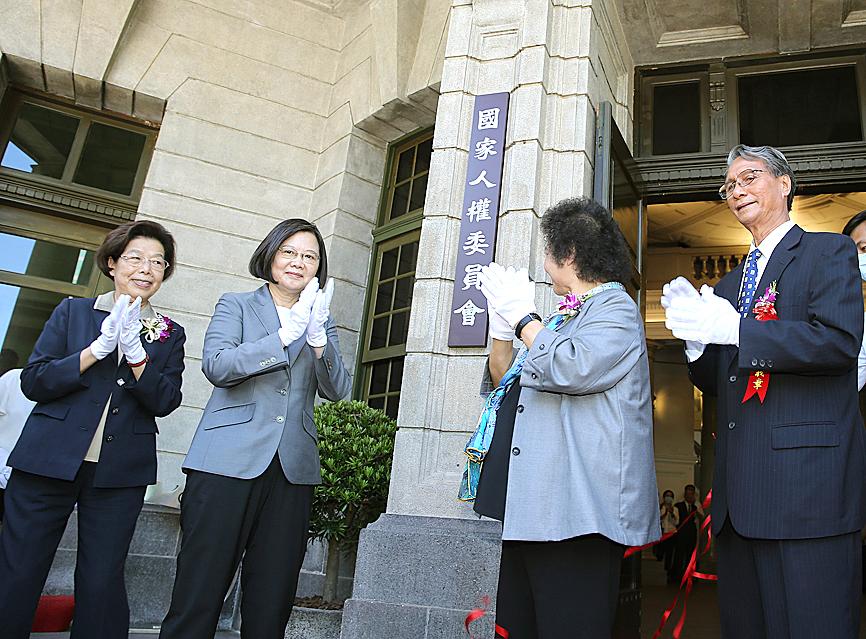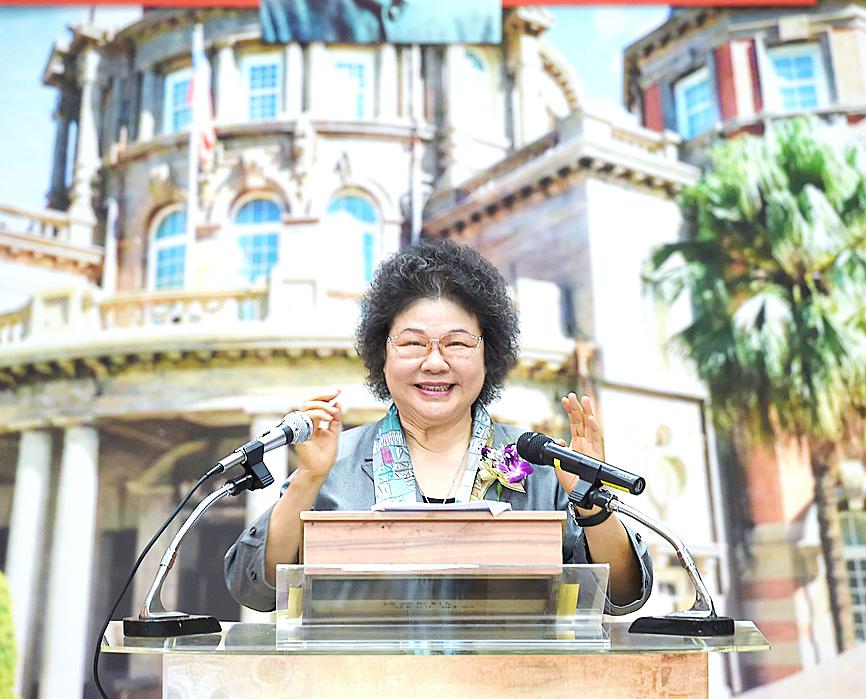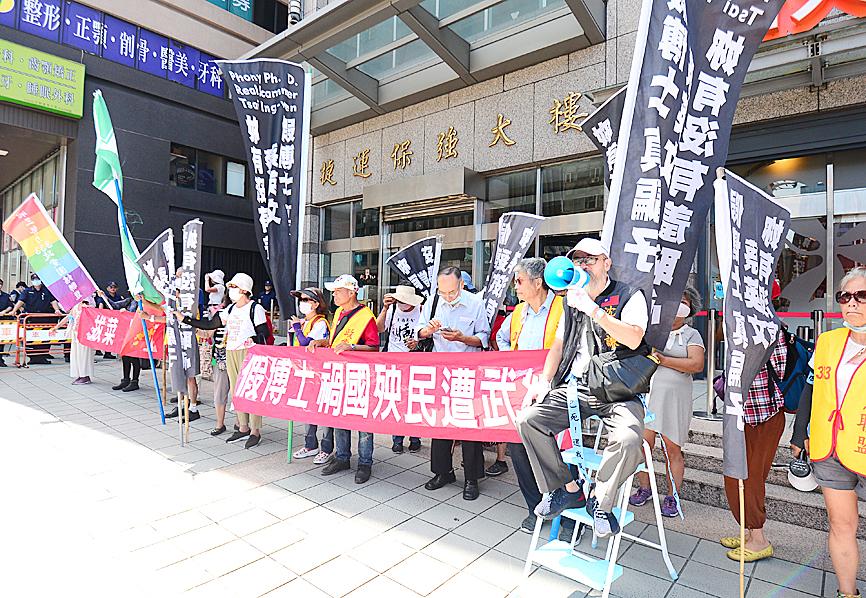President Tsai Ing-wen (蔡英文) yesterday said that she hopes the National Human Rights Commission, launched yesterday, would make a “unique contribution” to the international community by passing on the nation’s experience with promoting human rights.
Tsai made the remarks at a ceremony in Taipei to pass the position of Control Yuan president from Chang Po-ya (張博雅) to Chen Chu (陳菊).
Hailing the commission’s launch as a milestone in the nation’s efforts to protect human rights, Tsai said that the move is in line with the UN’s 1993 Principles Relating to the Status of National Institutions and signifies that Taiwan is one step closer to its ideal of “building the nation on human rights.”

Photo: CNA
The commission’s responsibilities include investigating human rights violations, researching and reviewing human rights policies, generating reports on human rights incidents, promoting human rights and engaging in international exchanges, she said, adding that the tasks should be conducted in the spirit of the Control Yuan as watchdog, while fostering local human rights institutions and instilling in residents a sense of respect toward other human beings.
Tsai said she hopes that commission members act as the nation’s conscience, exercise their authority fairly and independently, collaborate in introducing laws on the commission’s operations, interact smoothly with other branches of government, and work sustainably to improve human rights.
Even as the Legislative Yuan is to form a constitutional amendment committee in the next session, the government would press on with the goal of protecting human rights and upholding human rights to an international standard, she said.

Photo: Fang Pin-chao, Taipei Times
Civic groups have petitioned for the commission since 1998, Chen said, adding that she is both apprehensious and honored to serve as commission chairwoman.
The Presidential Office’s Human Rights Commission Consultative Committee, after adapting many international covenants on human rights to the nation, on May 19 ceased operations so that it could pass on the baton to the commission, she added.
Chen thanked all who paved the way for democracy and human rights in the nation, saying that because of their efforts, Taiwan can proudly proclaim to the international community that it is an advanced nation that values human rights.

Photo: Wang Yi-sung, Taipei Times
The commission is to be a voice for minority groups, comprehensively monitor human rights in Taiwan, consult on human rights, receive complaints on human rights infringements, offer human rights education, assess whether government policies protect human rights, and advise the Executive Yuan and Legislative Yuan on human rights legislation, she said.
Asked what human rights she hoped to bolster, Chen said that she would focus on the human rights of children, inmates and people who are mentally challenged.
Regarding her role as Control Yuan president, Chen said that she would shoulder the “historical responsibility” of transferring the branch’s functions to other agencies, while keeping the human rights commission operational even if lawmakers and the public decide to abolish the Control Yuan.

Several Chinese Nationalist Party (KMT) officials including Chairman Eric Chu (朱立倫) are to be summoned for questioning and then transferred to prosecutors for holding an illegal assembly in Taipei last night, the Taipei Police said today. Chu and two others hosted an illegal assembly and are to be requested to explain their actions, the Taipei City Police Department's Zhongzheng (中正) First Precinct said, referring to a protest held after Huang Lu Chin-ju (黃呂錦茹), KMT Taipei's chapter director, and several other KMT staffers were questioned for alleged signature forgery in recall petitions against Democratic Progressive Party (DPP) legislators. Taipei prosecutors had filed

Taiwan would welcome the return of Honduras as a diplomatic ally if its next president decides to make such a move, Minister of Foreign Affairs Lin Chia-lung (林佳龍) said yesterday. “Of course, we would welcome Honduras if they want to restore diplomatic ties with Taiwan after their elections,” Lin said at a meeting of the legislature’s Foreign Affairs and National Defense Committee, when asked to comment on statements made by two of the three Honduran presidential candidates during the presidential campaign in the Central American country. Taiwan is paying close attention to the region as a whole in the wake of a

NEW WORLD: Taiwan is pursuing innovative approaches to international relations through economics, trade and values-based diplomacy, the foreign minister said Taiwan would implement a “three-chain strategy” that promotes democratic values in response to US tariffs, Minister of Foreign Affairs Lin Chia-lung (林佳龍) said. Taiwan would aim to create a “global democratic value chain,” seek to capitalize on its position within the first island chain and promote a “non-red supply chain,” Lin was quoted as saying in the ministry’s written report to the Legislative Yuan submitted ahead of the legislature’s Foreign Affairs and National Defense Committee meeting slated for today. The Ministry would also uphold a spirit of mutual beneficial collaboration, maintaining close communication and consultations with Washington to show that Taiwan-US cooperation

Taiwan and the US have begun trade negotiations over tariffs imposed by US President Donald Trump earlier this month, Minister of Foreign Affairs Lin Chia-lung (林佳龍) said in an interview this morning before reporting to the Legislative Yuan’s Foreign Affairs and National Defense Committee. The Taipei Economic and Cultural Representative Office (TECRO), Taiwan’s de facto embassy in the US, has already established communication channels with the US Department of State and the US Trade Representative (USTR), and is engaging in intensive consultations, he said. Points of negotiation include tariffs, non-tariff trade barriers and issues related to investment, procurement and export controls, he